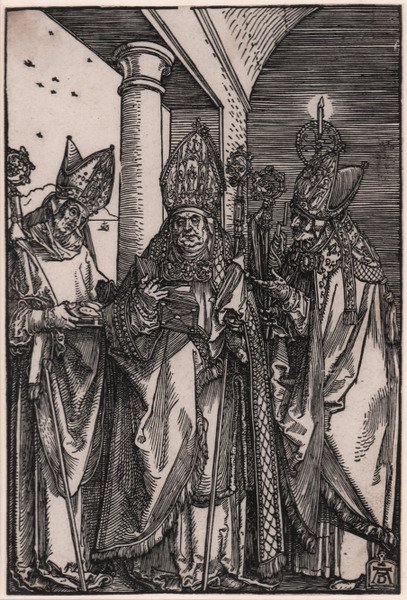Xilografia, 1505 circa, monogrammata nella tavoletta in basso a destra. Stato unico, nella terza variante, di cinque, descritte da Meder (n. 233 c/e), Magnifica prova, nitida e ben contrastata, nella terza variante descritta da Meder, caratterizzata da una piccola rottura del legno che comporta una mancanza di circa 5 mm nella parte superiore della linea d’inquadramento. In ottimo stato di conservazione. San Nicola, a sinistra, è identificato dal pane che tiene in mano, che gli fu portato durante una carestia sull'isola dove viveva, dalla barca sullo sfondo. Sant'Erasmo, a destra, sta portando le sue viscere, avvolte intorno a un rocchetto, e inoltre, è identificato dalla ruota con una candela accesa. Al centro c'è Sant'Ulrico, il patrono di Augusta, con in mano il suo simbolo, un pesce. Poiché è al posto d'onore, è stato ipotizzato che questo foglio sia stato commissionato o inteso per essere venduto ad Augusta. Il nome Ulrich non era comune a Norimberga. Questa stampa è spesso considerata come la controparte di un’altra xilografia, raffiguranti i SS. Lorenzo, Sisto e Stefano, sebbene le figure siano più allungate. Alcuni critici hanno anche riconosciuto un concetto spaziale che sembra corrispondere ad alcuni fogli de La Piccola Passione. Di conseguenza, datano questo foglio dopo il ritorno di Dürer dal suo secondo viaggio in Italia, cioè verso il 1508. Ma – osserva Strauss - questa xilografia corrisponde in troppi dettagli ad altre due: il soggetto, lo sfondo, gli uccelli, e inoltre il tipo di carta su cui è stampata, che non la distingue affatto dalle altre cosiddette "modest woodcuts", tutte riferibili agli anni 1503-1505. La forma della tavoletta che porta il monogramma è unica, ma rudimentale. Queste differenze possono essere più propriamente attribuite alla presenza di un'altra mano nella bottega di Dürer che ha modificato il disegno di Dürer in fase di intaglio. Bibliografia Bartsch, 118; Meder, 233 (c/e); Tietze, 398; Panofsky 338; Strauss n. 88. Woodcut, 1505 circa, signed with monogram on tablet lower right. Only state. Impression of Meder variant c/e, with a 5 mm gap in the upper border. Good impression, black, full-bordered, with a 5mm gap in the upper border according the variant c/e described by Meder. Very good condition, “St. Nicholaus, on the left, is identified by the bread he is holding, which was brought to him during a famine on the island where he lived by the boat in the background. St. Erasmus, on the right, is carrying his entrails, wound around a reel, and in addition, is identified by the wheel with a burning candle. In the center is St. Ulrich, the patron saint of Augsburg, holding his symbol, a fish. Because he is in the place of honor, it has been surmised that this sheet was commissioned or intended to be sold in Augsburg. The name Ulrich was not common in Nuremberg. This print is often regarded as the counterpart to the preceding one (no. 87), although the figures are longer elongated. Some commentators have also detected a spatial concept that seemingly corresponds to some of the sheets of "The Small Passion' (nos. 106-142). Accordingly, they date this sheet after Dürer's return from his second Italian journey, i.e. c.1508.2 We find that assumption highly speculative. This woodcut corresponds in too many details with at least the two preceding ones: the subject, the background, the birds, and moreover the type of paper that it is printed on, which in no way sets it apart from the other "modest" woodcuts. The shape of the tablet bearing the monogram is unique, yet primitive. These differences can more properly be ascribed to the presence of another hand in Dürer's workshop who modified Dürer's design in preparation for the cutter.” (cf. Strauss, n. 88, p. 296). ' Literature Bartsch, 118; Meder, 233 (c/e); Tietze, 398; Panofsky 338; Strauss n. 88. Cfr.


Descubre cómo utilizar
Descubre cómo utilizar

